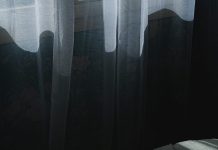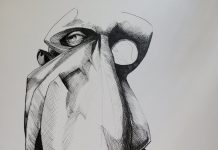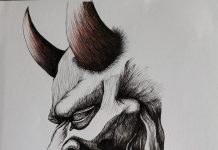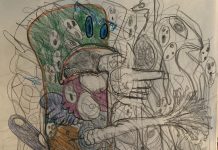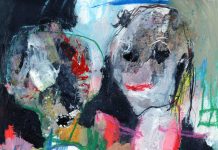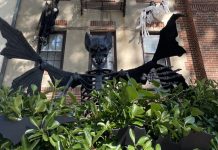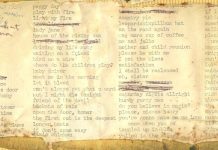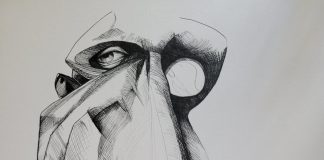S E V E N B E L L S
They are studying homelessness at the high school, that’s what the kid said, as if it’s a thing on a petri dish, a common noun, or a mechanical device.
He spoke through the fence from where he stood on the sidewalk, the street was quiet, he wasn’t dressed for the weather, he was shivering, first week of November you need more than a school blazer.
In white words he asked if I’d help him with his project.
Mine was the only fire going, light was just sparking up between the buildings on one side and the trees on the other. I could have said anything back to him, or nothing at all, I could have told him to fuck off and I might have, but just then a grapefruit flew between us like a breakneck sun.
It came from Saint Rose – I’d rather get scurvy, she yelled – she’s such a pirate.
The kid said some idiot in his class probably gave her the fruit as a bribe, he said everybody wanted to interview Saint Rose.
I told the kid to tell his friend Saint Rose preferred her fruit fermented.
Seven bells peeled, he looked in their direction with interest and patience, he rather absorbed them, and when they quieted he said it again, earnestly through the fence as if I hadn’t heard the first time, we are exploring homelessness.
I shrugged and said, me too.
Project’s due tomorrow.
Don’t they teach you anything? – my words also white – tomorrow never comes.
He asked if I would keep a diary of my day, and again I could have said anything, nothing, a pomegranate flew by, I reached for the bag he offered and placed it on the ground in front of me.
Thank you, I’ll be back same time tomorrow.
There was motion in his voice like residual bits of the seven bells he had eaten, or perhaps he was just nervous, something else went by, similar to a lime but probably an avocado, it hit my retreating student in the shoulder, and fell to the ground a pear.
It’s been a while since I’ve written anything.
There’s a church you can see from here, with a bell tower, looks like it belongs on a crumbling coast somewhere, maybe the cliffs above the rough rubbled shores of Ireland. We call it a church but it is a Gothic cathedral, with 12 change ringing bells. Its spire was once the tallest structure in Canada and it does not lose its grandness in spite of all the neighbouring stacked and gleaming giants, its white brick and sandstone walls absorb the light, maybe some sins, it glows.
We used to pile into its paupers’ cemetery at night, we’ll end up there anyway so not really trespassing like they said, more like practicing, but they have made it inhospitable, armrests have been installed on the benches denoting individual seats, they prevent us from laying down, but give the impression of portioned-out generosity.
Little bright bulbs like falling stars but grapes, a galaxy of them land at my feet, the idiot who wanted the interview with Saint Rose pelts by, I say thanks for the grapes to her shape, they are cold and hard and sweet.
Things are starting to change here, it’s like the depiction of dawn in a musical play, all the tents open at once and people stretch and yawn from them, some bolt, there’s an incohesiveness, a chaos that looks like it could snap into something choreographed, Gloria at the edge of the forest with her umbrella on twirl, one-handed Marcus in a warrior two variation, a few others pushing and pulling, something of a rhythm comes, fires are lit, and here we are, in the combined glow of morning.
Somebody shouts out their madness, somebody else says, shut up, Harry.
Such is life in Trinity Park, where tomorrow comes every single day to those of us who thought it never would.
N I N E B E L L S
Shakespeare wrote, hell is empty and all the devils are here.
First time I heard it was the Cadet Cleaners guy who delivered my father’s shirts to our house when I was a kid, maybe he didn’t say it to me but I was the only one there, he seethed it when we passed in the hallway at the restaurant. Every time we went out for dinner he was there, hunched at the counter, his head at a threatening angle, only his eyes moved, they shifted between his plate and the mirror in front of him, his reflection like a horror movie poster, Jack Torrens or Max Cady.
I only mention him because he was the first devil I knew, he remains my benchmark devil, most of the ones here don’t qualify, deviant behaviour does not a devil make.
Here beneath the clouds I am gatekeeper, the criteria for admission are somewhat arbitrary, but for denial they are precise.
We feel time in our bones, the peal from the cathedral remains the largest in North America, peal is measured in distance rather than decibel, the way I measure devils by their reach.
At nine bells dawn is over and we are looking for something else, the alcohol and drug seekers lurch away, other groups or couples fray, the rest of us go it alone, our searches individual, mine is to find my self – the one who is courageous, whose heart beats with ferocity, who would have been a playwright – for it is this self to whom I trust my residue, mine own gatekeeper, the one who stores what is necessary and lets the rest go.
This life has few comforts, the daily discovery of this self is one, poetry seeps in already, for make no mistake, we are all poets, we homeless in Trinity Park.
Where do you think your gatekeepers rest?
T W E L V E B E L L S
I would have been a playwright.
Something like: A single beam of light on a size seven sweater which hangs on the back of a chair in a hollow room. The owner of the sweater is missing. Her mother, by the window’s early light, picks the sweater up, sits in the chair, threads a needle and stitches along the sweater’s edges. The turquoise thread melts into the turquoise wool, she remembers knitting it, purposefully large, her strategy backfired and the sweater, forgotten until this year, is now a poor fit, her daughter’s delicate wrist bones rise from the final row of stitches like pearls. When she looks out the window she places a button into her mouth and sucks its clacking shape, the sweater hangs from her lips and down her throat, it widens at her stomach and narrows into her lap. She tries to remember if her daughter mentioned a double sleepover, she looks down the road watching for the girl to come to her like thread through a needle.
Or something like that.
I have food in my tent, canned things, as well as apples and carrots I gnaw, decay is not specific to the homeless, the gums of all humanity recede, but like the fast grapefruit sun there is acceleration here.
We time, we count, eyes like the Cadet guy but without feeling or judgement, we count in secret, we all count – will the body before ours be the final to cascade into the cathedral ground? – when will they say when, we all count. We count cigarettes and coins, clouds, birds, we count empty bottles, years, and we count the bells, we believe we are for whom they toll, we hope there is room for one more, we are neither -full nor -less, hope’s proportions are various as the clouds, the starlings that give, at this time of year, shape to the sky.
O N E B E L L
There is a woman who says, I am so far away from home, into the space between her and everyone who passes, the words travel through the fence, she says it in the same way others ask for spare change. I think people would rather hand over what’s in their pockets than what is in, or not in, their hearts. She makes the office girls with their shoes and handbags think of home, their ageing mothers who iron in the next room, the window through which sheep sway over knitted green fields, their father, too, his miniature shape seems to stride along the windowsill.
Trinity Park is not entirely fenced in, we have 180 degrees of free forest that tumbles into a ravine after which the birch rise again and thin, for a few flat miles only grass rolls, and then railroad tracks – show me a homeless heart that is not stirred by the whistle of a train – and then Lake Superior. We know of its wildness but see no evidence, from here it looks contained under glass, impossibly gigantic ships appear, one wonders how they stay afloat, the office girls who walk along the sidewalk on the other side of the fence feel the same about the old men who gaze at these ships as if lending them buoyancy, they wonder how the men stay alive.
Nocturnal Matik yells in her sleep, her teepee in full sun, she pleads for a canoe. Every night she tells the same fireside tale of when she was forced into a boat that took her from her home on the reserve to assumed safety, her mother yelled from the shore for her to sit backwards and memorize the way, this was Lake of the Woods, brimming with islands, Matik says even now she could get home if only she had the chance, that the islands are fixed behind her eyes, when she walks, she paddles.
There is a knot of women who gather at one bell upon a picnic bench that has been burned in the centre, they are the trolls at our gates, my helpers – they keep the gawkers away while I consider the candidates – their stringy hair and fattened bodies roll and smash together, clothing like seaweed, they are a coven of toothless wretches, they shout and laugh at those who work across the street, the ambitious young, who they say will one day take their place.
One bell reminds us of our loneliness, the ramifications of the other shoe that will surely drop.
I warm soup in an iron pot that hangs over my fire, they come to it with tin cups like a Dickens’ story, like we are acting in a renaissance play, many of us forget the audition, we don’t know quite how we landed the part.
Homelessness is not a condition nor a profession but an art.
F O U R B E L L S
My student dressed for the weather after all, four bells it’s warm, more September than November, everybody loosens, the high school kids drape their jackets over their shoulders, our trolls strip their weeds. I spy my student, he is younger than he seemed this morning, his face fresh and dazzling, I look up from the bright lined page and catch his eye. I wonder how he sees me, do I look like a wizard, my beard blackly pointing toward the ships, my own I am so far away from home in its furls – or another sage – Dylan Thomas perhaps or the playwright I would have been, my poetic stanzas all lined up, sometimes I want the words to be less perfect, less proper, my education betrays my heart, I want to say things as they are and leave the superfluous, I want to say fuck off and I end up saying fuck thee off.
I hunch to my work, the wind into my straining mouth.
Four bells is when the door to sanity starts to close, the other door is also closed, we are in a variation of purgatory, not unlike the warm space between the doors to the barroom, the one behind us closed against the winterous outdoors, the other closed, we wait.
The skies are porous, perilous – when will the darkness?
E I G H T B E L L S
At eight bells Harry’s madness torques, Saint Rose spreads curses, Marcus feels for his pulse with his missing hand, our trolls haggle, the skeleton of Gloria’s umbrella is dragged away screaming, Matik madly paddles – this is the underside of fairy tales – the forest ragged and barely distinguishable from the sky, sirens on the other side, trains roar.
I retreat into my tent like a child into his bedroom when his parents start tearing discontent into objects they throw, one skids down the hallway and comes to unrest in the strip of light beneath the door, it finds its way under the beds of the young, and the discontent continues.
There is enough light, some comfort in my tent, my student will return tomorrow morning at seven bells and I will hand my pages over to him, my careful words designed to add weight to his bones and allow no monsters beneath.
S E V E N B E L L S
Mornings feel as if my tent is plunged into light, its sensitive skin glows from the bottom up, there are no rips but plenty of scars, soon the bells will soften into snow and during those harsh and beautiful months their peels do not reach us.
Do they toll for thee?
Spring will once more come like a blessing and my tent will again dip into light and warmth, our trolls will frolic, Saint Rose will scurry through the city and return rich, Matik will cry out for her canoe, we count, feral Harry may have fallen into the final space in the paupers’ grave, we remember our far away homes, our mothers in the next room, our fathers in the fields, the floating sheep, the ships will continue, the shivering city, the trains through our shoulders.
I pack my pages into the bag like an inheritance, advice for my student who didn’t ask for advice waits in my mouth.
He hears what I say in the same way he listened to the seven bells yesterday morning, he looks at my words, I tell him to notice all of life – the forests and cities! the churches! the graveyards! the cries and whispers! the skies! seas! and rivers! all the grapefruit days! – and I tell him in noble words he absorbs, that life is no less a miracle when seen from the inside of a pale and worn tent.
“I had observed that the men who were most in life, who were molding life, who were life itself, ate little, slept little, owned little or nothing. They had no illusions about duty… or the preservation of the State. They were interested in truth and in truth alone.”
— Henry Miller


